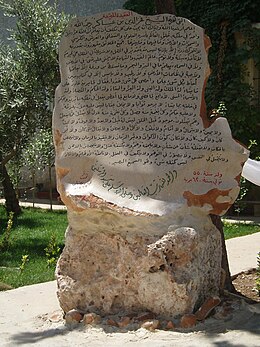
Back أبو إسحاق الشيرازي Arabic ابواسحاق شیرازی Persian Abu Ishaq asy-Syirazi ID Abu Ishaq al-Shirazi Italian Абу Исхак аш-Ширази Russian Абуисҳоқи Шерозӣ Tajik ابو اسحاق شیرازی Urdu Abu Isʼhoq Sheroziy Uzbek
Abū Isḥāq al-Shīrāzī أبو إسحاق الشيرازي | |
|---|---|
| Title | Amir al-Mu'minin fī al-Fiqh Shaykh al-Islam[1] |
| Personal life | |
| Born | 1003 |
| Died | 1083 (aged 79–80) |
| Nationality | Persian |
| Era | Islamic Golden Age |
| Main interest(s) | Fiqh (Islamic jurisprudence), Usul al-Fiqh (principles of jurisprudence), Usul al-Din, 'Aqidah, Tawhid, Kalam (Islamic theology), Hadith studies |
| Notable work(s) | |
| Religious life | |
| Religion | Islam |
| Denomination | Sunni |
| Jurisprudence | Shafi'i |
| Creed | Ash'ari[2][3][4][5] |
| Muslim leader | |
| Successor | Abu Sa'd al-Mutwalli |
| Part of a series on |
| Ash'arism |
|---|
 |
| Background |
Abū Isḥāq Ibrāhīm ibn ʿAlī al-Shīrāzī (Arabic: أبو إسحاق الشيرازي) was a prominent Persian[6] jurisconsult, legal theoretician, theologian, debater and muhaqqiq (researcher).[7] He was one of the leading scholars of Shafiʿi jurisprudence in the eleventh century and arguably the most prolific writer of Islamic legal literature.[8][9]
He became the second teacher after succeeding Ibn al-Sabbagh at the Nizamiyya school in Baghdad, which was built in his honour by the vizier (minister) of the Seljuk Empire Nizam al-Mulk.[10]
He acquired the status of a mujtahid in the field of fiqh and usul al-fiqh. The contemporary muhaddithun (hadith specialists) also considered him as their Imam. Likewise, he was respected and enjoyed a high status among the mutakallimun (practitioners of kalam) and Sufis.
He was closely associated with the eminent Sufis of his time like Abu Nasr ibn al-Qushayri (d. 514/1120), the son of al-Qushayri (d. 465/1072).[11]
Abu Bakr al-Shashi said: "Abu Ishaq is Allah's proof on the leading scholars of the time."[12] Al-Muwaffaq al-Hanafi said: "Abu Ishaq is the Amir al-Mu'minin (Prince of the Believers) from among the fuqaha' (jurists)."[1] The Azhari scholar 'Ali Jum'a, an inheritor of al-Bajuri's teachings, calls him the "shaykh of the fuqaha' of his era."[11]
- ^ a b Al-Dhahabi. "Siyar A'lam al-Nubala' (The Biographies of the Most Noble)". Islamweb.net.
- ^ Mohammad Suhail E.M al-Hudawi (2017). Theological thoughts of Abu Ishaq al-Shirazi. International Islamic University Malaysia. ISBN 9789674186074.
All the views he expresses in Kitab al-Ishara are in conformity with the views of the early generation of the Ash'arite theology. … [H]e is an ardent follower of the Ash'arite school based on his two works in Theology, namely Kitab al-Ishara and 'Aqaid al-Salaf which clearly assert this point. The fatwas he issued to explain his stand on Ash'arism also confirms his allegiance to the Ash'arite School.
- ^ Massignon, Louis (2019). The Passion of Al-Hallaj, Mystic and Martyr of Islam, The Survival of Al-Hallaj. Vol. 2. Princeton University Press. p. 158. ISBN 9780691657219.
Abu Ishaq Shirazi, the Ash'arite rector of the Nizamiya
- ^ A. C. S. Peacock (February 2013). Early Seljuq History: A New Interpretation. Taylor & Francis. p. 104. ISBN 9781135153694.
Abu Ishaq al-Shirazi, the leading Ash'ari in Baghdad
- ^ Yassin Ghanem Jassim al-Aridi (2024). Classes of Ash'aris, notables of the people of the Sunnah and the community. Dar al-Kotob al-'Ilmiyya. pp. 121–122. ISBN 9786144962350.
- ^ وفيات الأعيان وأنباء أبناء الزمان، أحمد بن محمد بن إبراهيم بن أبي بكر ابن خلكان البرمكي الإربلي، أبو العباس، دار صادر - بيروت، 1972، ج. 1 ص.30
- ^ "Abū Isḥāq al-Shīrāzī". Reference Works – BrillOnline.
- ^ Christopher Melchert (2002). "The Formation of the Sunni Schools of Law, 9th-10th Centuries C.E". Islamic Law and Society. 9 (1). Brill: 116–119. ISBN 9789004109520. JSTOR 3399203.
- ^ "Abu Ishaq Ibrahim ibn ʿAli Shirazi". Oxford Reference.
- ^ Salim bin Samir al-Hadrami (2014). The Ship of Salvation. Translated by Abdullah Muhammad al-Marbuqi. Pustaka Tok Kenali. p. 101. ISBN 9789671221815.
- ^ a b Aaron Spevack (2014). The Archetypal Sunni Scholar: Law, Theology, and Mysticism in the Synthesis of al-Bajuri. State University of New York Press (SUNY Press). p. 84. ISBN 9781438453712.
- ^ "Who was Abu Ishaq al-Shirazi?". Darul Tahqiq. 5 July 2019.